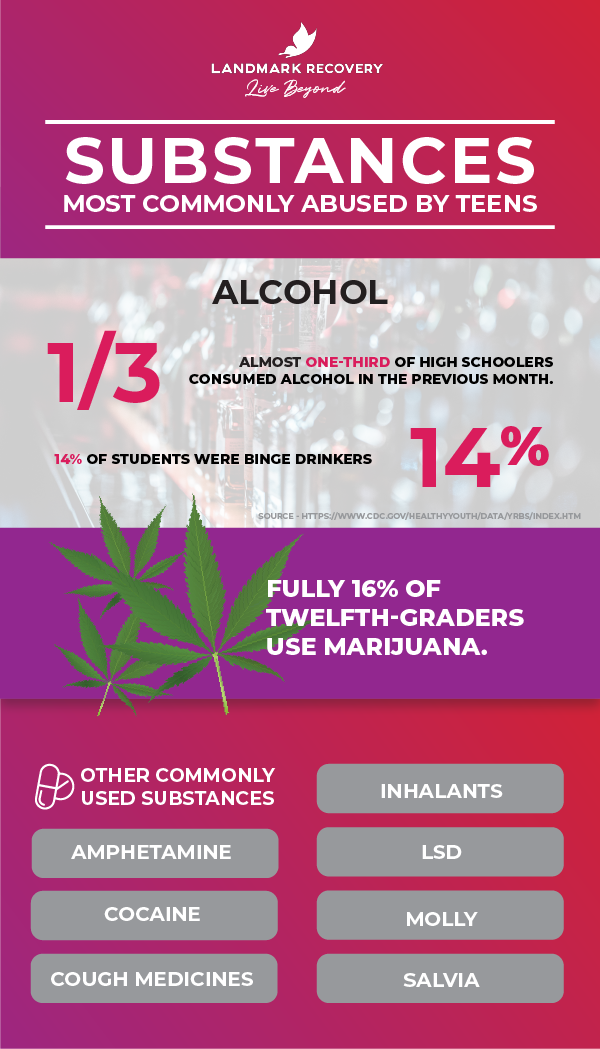Learn the Signs Of Drug Use in Teens
Many parents all across the world are looking for signs of drug use in teens.
In many cases, teen mood swings can be blamed on hormonal changes, but that’s not always the case. If you notice shifting moods accompanied by changes in appearance and behavior in your teen, underage drug use could be responsible.
As a parent, you should never feel guilty for treading cautiously. If you suspect your teen is using drugs, take action and open a dialogue so you can address this issue head-on. This is crucial since some teens use drugs to self-medicate against depression or anxiety, and It’s better to catch these issues early rather than allowing drug use to inflame the situation.
Becoming familiar with the signs of drug use in teens can help you determine whether you’re witnessing growing pains or something more sinister.
Before we show you what to look out for specifically, next we’ll look at why teens get involved with drugs.
Why Teens Use Drugs
There are many possible causes of underage drug use. Some of these include:
- Academic pressure: Some teens use stimulant prescription medications like Ritalin and Adderall in the hope of boosting their academic performance. The academic pressure teens face throughout high school and college often triggers drug use as a coping mechanism.
- Curiosity: For many teens, encountering drugs for the first time in high school is enough to pique their curiosity, and that’s sometimes all it takes.
- Emotional problems: With teens experiencing a freefall of emotions, many use drink or drugs to blot out negative feelings.
- Escapism: It’s not uncommon for teenagers to use drugs as a pure means of escapism.
- Peer pressure: Peer pressure is among the most common reason for teens experimenting with drugs. Adolescence is a period where peer pressure is at its strongest, and this often involves risky behaviors.
Just as teenagers use drugs for different reasons, so they use different drugs.
Next, we’ll look at the most frequently abused substances among this demographic.
Substances Most Commonly Abused By Teens

According to the 2015 Monitoring The Future Survey by the National Institute on Drug Abuse, alcohol and marijuana are the substances most commonly abused by teens. 58% of students tried alcohol during the previous year, while 35% had smoked weed.
Alcohol
Underage alcohol consumption is commonplace in the US.
According to the 2019 Youth Risk Behavior Survey, almost one-third of high schoolers consumed alcohol in the previous month. 14% of students were binge drinkers, while 5% of students drove after consuming alcohol.
Fortunately, rates of drinking are declining among high school students.
Marijuana
With the increasing legalization of marijuana, cannabis products have never been more easily available for teens. Fully 16% of twelfth-graders use marijuana.
More and more teens are vaping and dabbing marijuana in addition to smoking it. This leads to even more intense effects.
Using marijuana is linked to impaired academic performance, so it’s worth stepping in if you feel your teenager is smoking weed.
Prescription Drugs
Luckily, the opioid epidemic has not drastically impacted high schools. Indeed, the abuse of prescription drugs has decreased among teens over recent years.
Students often resort to stimulants like Ritalin or Adderall for performance-enhancement purposes.
Other Drugs of Abuse Among Teens
Almost one-quarter of high school students in the United States use at least one illicit drug.
Some students use more than one drug, and drugs are often combined with tobacco and alcohol.
The other most commonly abused drugs by teens are:
- Amphetamine
- Cocaine
- Cough medicines
- Inhalants
- LSD
- Molly (MDMA)
- Salvia
Signs of Drug Use in Teens
The signs and symptoms of drug use in teens vary depending on the substance being abused. That said, there are some general warning signs. These can be neatly cleaved in two:
- Physical signs
- Behavioral signs
Physical Signs of Drug Use in Teens
Here are some classic physical symptoms of teen drug use:
- Anxiety
- Bloodshot eyes
- Bruises
- Cold palms
- Enlarged pupils
- Extreme tiredness
- Fidgeting
- Flushed cheeks
- Frequent sickness
- Glazed expression
- Headaches
- Hyperactivity
- Irritability
- Licking lips
- Nosebleeds
- Paranoia
- Poor personal hygiene
- Puffy face
- Rapid weight gain
- Rapid weight loss
- Runny nose
- Shaking hands
- Smell on clothing
- Sores on mouth
- Track marks on arms and legs
- Wearing long sleeves in summer
Behavioral Signs of Drug Use in Teens
Often, it’s the behavior of your teen that betrays their substance abuse, even if they appear physically unscathed.
Common behavioral indicators of addiction include:
- Abandoning old friends
- Acting irresponsibly
- Avoiding eye contact
- Damaged relationships
- Frequently asking for money
- Ignoring and breaking curfew
- Isolating from others
- Locking bedroom doors
- Losing interest in hobbies
- Lying
- Making calls in secret
- Making excuses
- Missing school
- Neglecting responsibilities
- Problems with grades at school
- Resisting discipline or feedback
- Stealing
So, now you know what markers to watch for, how can you start piecing these clues together?
How Can You Tell If Your Teen Is Using Drugs?
An awareness of the common signs of drug use in teens should help you start firming up your suspicions, and here’s what to do next:
- Look your teen in the eyes: If you feel your teen might be smoking marijuana, pay close attention to their eyes. If they are red and heavy-lidded with constricted pupils, your hunch could be right. Dilated and unfocused pupils, by contrast, suggest your teen has been drinking.
- Use your nose: If you can smell smoke or alcohol on your teen’s breath, this is an obvious giveaway.
- Monitor their behavior: Watch how your teen behaves after a night out with friends. Are they loud upon returning home, or are they unusually clumsy? The following day, do they appear fatigued, slack-eyed, and withdrawn? Do they sleep most of the day? Are they physically sick? All of these behaviors are indicative of drinking or drug use.
- Search their room as a last resort: Invading your teen’s privacy might not be something you would typically consider. If you suspect they are using drugs, though, you should not hesitate to explain to your teen why you need to look through their personal space. You could also think about searching your teen’s cell phone or other digital devices.
Assuming you find evidence of drug use, you should let your child know that you’ll be having a frank and honest conversation about this issue. Whatever happens, don’t let them deflect things by arguing about an invasion of privacy.
What Comes Next
Do you feel your teen might be abusing drink or drugs to the point of addiction? If so, don’t hesitate to reach out to our friendly team at Landmark Recovery.
It’s better to take action that proves unnecessary than allowing substance abuse to deteriorate to the stage where dependence sets in. Call us today at 888-448-030

Choose Recovery Over Addiction
We're here 24/7 to help you get the care you need to live life on your terms, without drugs or alcohol. Talk to our recovery specialists today and learn about our integrated treatment programs.




